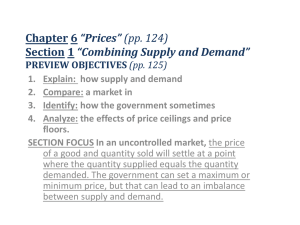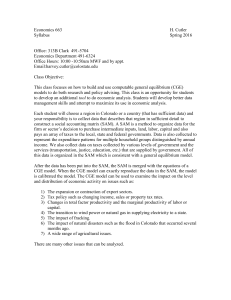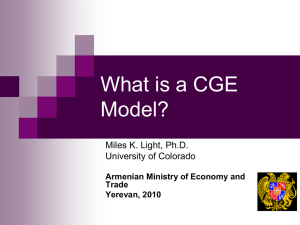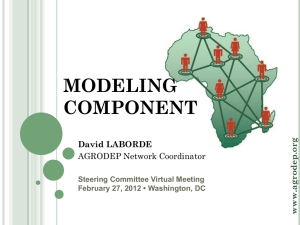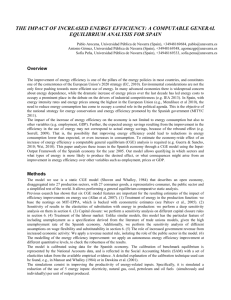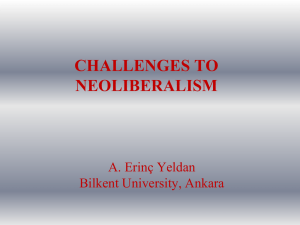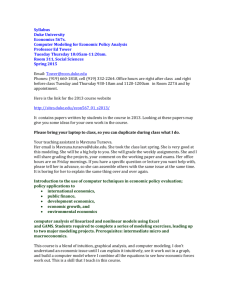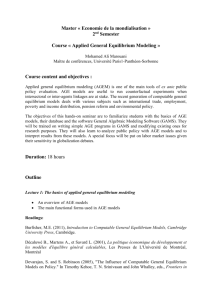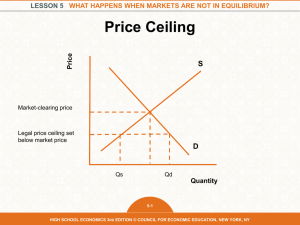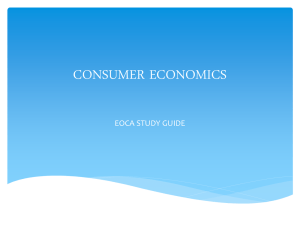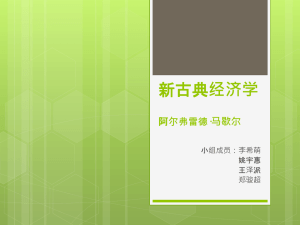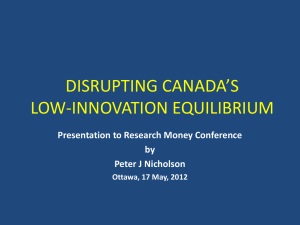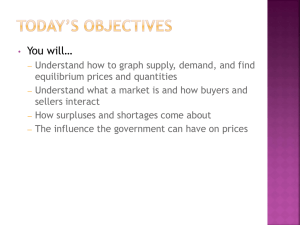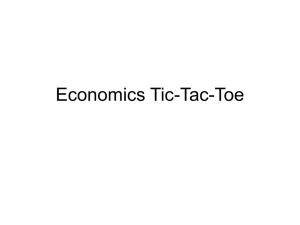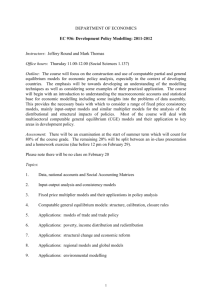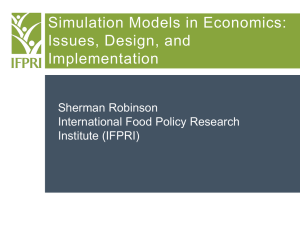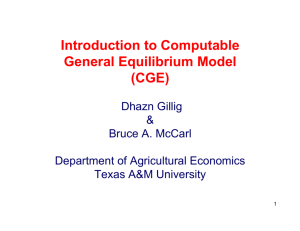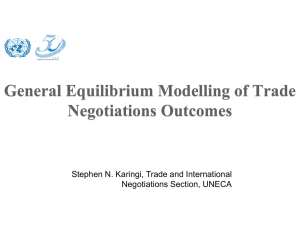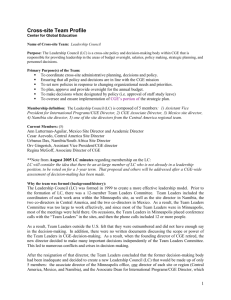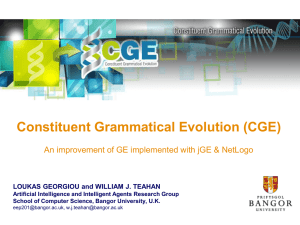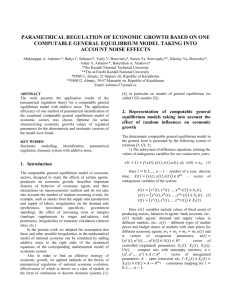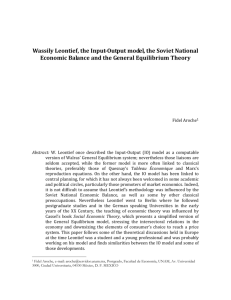Power Point Presentation
advertisement
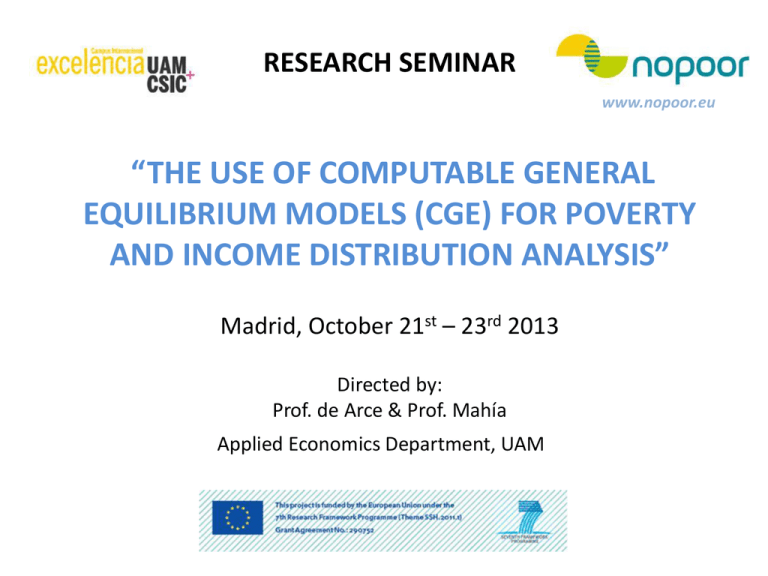
RESEARCH SEMINAR www.nopoor.eu “THE USE OF COMPUTABLE GENERAL EQUILIBRIUM MODELS (CGE) FOR POVERTY AND INCOME DISTRIBUTION ANALYSIS” Madrid, October 21st – 23rd 2013 Directed by: Prof. de Arce & Prof. Mahía Applied Economics Department, UAM Web Page: http://www.uam.es/rafael.dearce/cge_seminar_october.htm WIFI connection: User: Password: Software: GAMS http://www.gams.com Reception of Participants: Classroom: nopoor2013 20!3%NpRu4M Facultad CC.EE.EE. UAM Módulo 14. Centro Predicción Económica Salón de Grados “Emilio Fontela” Facultad CC.EE.EE. Mornings: Módulo 14. Class: 105 (downstairs) Afternoons: Mód. 14. Class: 201 (middle floor) COMPUTABLE GENERAL EQUILIBRIUM MODELS Macro Micro MATHS DATA (SAM) COMPUTABLE GENERAL EQUILIBRIUM NATIONAL ACCOUNTS COMPUTABLE GENERAL EQUILIBRIUM MODELS STATIC vs DYNAMIC – PARTIAL vs GENERAL EQUILIBRIUM Partial Equilibrium General Equilibrium Static Dynamic Markets performance (microecomics) Interlinked Markets (Walras / Debreu) Microeconometric models CGE MODELS and Macro econometrics Economists of the Time: Partial Equilibrium and Static concept IO models (Leontief): General Equilibrium and Static concept Macroeconometric models (Tinbergen, Klein): GE and Dynamic SOME HITS OF A NON EXHAUSTIVE HISTORY OF CGE MODELS Quesnay, 1758 Laussane Academy, (Switzerland): Léon Walras and Vilfredo Pareto Leontief’s “Inter-relation of prices, output, savings and investment” (1937) The Arrow- Debreu general equilibrium theory (1954) The Cambridge Growth Project and Richard Stone (1960’S) Norway CGE Model, Johansen, 1960 AGE Model and Scarf linnear solutions Taylor & Black, 1974. Introducing external disequilibrium Adelson and Robinson, 1976. “Chain of models as a dynamic approach” MONASH / ORANI Models for Australia and GEMPACK software GTAP – IFPRI – World Bank USING CGE MODELS (from Cockburn et Al. (2008)) the effects on: • Macro variables, including measures of nation-wide or even global economic welfare; • industry variables; • regional variables; • labour market variables; • distributional variables; and • environmental variables of changes in: • taxes, public consumption and social security payments; • tariffs and other interferences in international trade; • environmental policies; technology; • international commodity prices and interest rates; • wage setting arrangements and union behavior; and • known levels and exploitability of mineral deposits (the Dutch disease). THE SIMPLEST MODEL Source: Hosoe, 2004 SOCIAL ACCOUNT MATRIX (SAM) SCHEMA Source: Mitra-Khan, 2008 SAM is read from column to row, so each entry in the matrix comes from its column heading, going to the row heading: For example, Consumption (C) comes from households and is paid to firms.. EXTENDED CGE MODEL (Example in Hosoe, 2004) MATHEMATICAL FUNCTIONS FOR COMBINING ELEMENTS (… for example, production factors) Name Production Function Linnear Q = aK + bL Cobb-Douglas Q = AK a Lb Leontief ìK Lü Q = min í ; ý / k > aQ; L > bQ î a bþ CES Q A ( K (1 ) L ) h / σ (K,L) ε ∞ 1 1 α+β 1 if 0 1 1+ r K L = a b h … CES as a Generalized Exprexion …. MATHEMATICAL FUNCTIONS FOR COMBINING ELEMENTS (… for example, production factors) Linnear Cobb-Douglas Leontief The elasticity of Substitution (sigma) represents the shape of the isoquants curves COMPUTABLE GENERAL EQUILIBRIUM MODELS DATA PARAMETERS VARIABLES CALIBRATION SHOCK • Social Account Matrix • Identifying the elements • Declaring parameters • Calculations • Declaring variables • Defining equations Data Schema Functional Schema • Producing the initial General Equilibrium • Introducing a shock in the system • Return to the equilibrium Simulation Game SWOT DIAGRAM STRENGTHS Performing simulations in spite of limited data. Matching theory and data. WEAKNESS Non testing capabilities about elasticities estimates. Assumptions about functions and some elasticities OPPORTUNITIES Disaggregating actors behaviour from specific surveys. Clarifying the political debate. THREATS Exponential increase of linkages. Irregular calibration methods. REFERENCES Cockburn, J., Decaluwé, B. & Robichaud, V. (2008): “Trade Liberalization and Poverty: A CGE Analysis of the 1990s Experience in Africa and Asia”. Poverty and Economic Policy (PEP) Research Network, 2008. Hosoe, N. (2004): “Computable General Equilibrium Modeling with GAMS”. National Graduate Institute for Policy Studies, Mimeo. Mitra-Khan, B. (2008): Debunking the Myths of Computable General Equilibrium Models, SCEPA Working Paper 2008-1.
